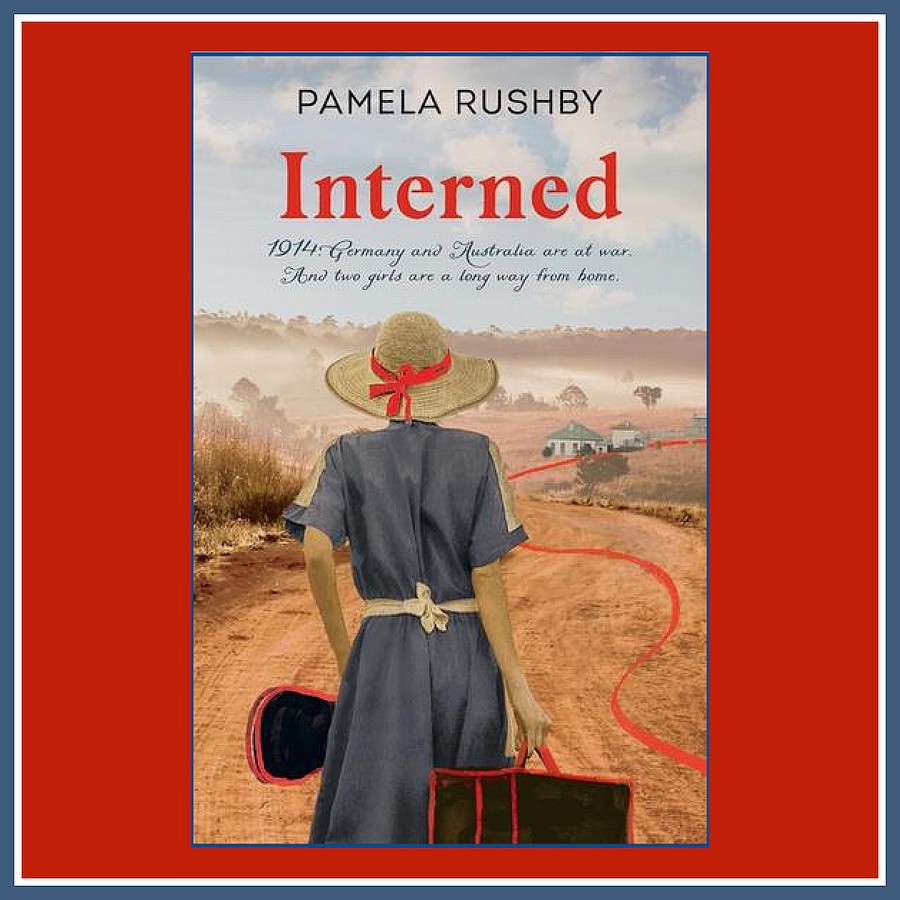
Interned by Pamela Rushby and published by Walker Books Australia is a well-paced and meticulously researched read that opened our eyes (I read this as a read aloud with my children) to yet another shameful and racist part of Australia’s history. This story is set mostly in the fictional rural town of Bornabba in Australia where people of German descent, labelled as “enemy aliens”, were taken from their homes and interned during World War 1. While this town was fictional, internment camps did exist in Australia, where mostly men, but also some women and children were detained behind barbed wire purely because of their German heritage. This story is based on the Berrima Internment Camp in New South Wales. People who were born in Australia, but had German parents or grandparents, as well as people living in British territories such as Singapore were deemed “enemy aliens” and sent to internment camps in Australia for indefinite periods of time. There is an example in the book of a third-generation person, the Lutheran Pastor, being detained.
This story highlights some of the ways the anti-German propaganda machine worked in Australia to disseminate information to vilify Germans (in this case, Australians of German origin) to the point where families of German descent changed their names and anglicised them due to the anti-German sentiment to rid any connection to Germany. German immigrants who were upstanding people were suddenly viewed with suspicion, successful German businesses were no longer supported and vandalised. In the Author’s note Pamela Rushby explains the far-reaching impact the anti-war sentiment had on anyone that was labelled as an “enemy alien”, the rights they lost and the way it became compulsory for people of German descent to register their names and report to the police on a weekly basis. They were subject to a baffling and long list of rules, orders and prohibitions such as being forbidden to own a car, telephone, camera or homing pigeon. With the onset of World War I life was swiftly and irrevocably changed for these people and their families.
This story is told from the perspective of two young girls (they are 12 at the beginning of the story), Greta and Tilly, girls leading very different lives in different countries and who were brought together because of Australian government policy during World War I.
Gretta, whose father was a successful businessman, lived a very privileged life in Singapore, surrounded by opulence and luxury. She lived in a grand house with servants who discreetly tended to the upkeep of the house, gardens and the needs of the family. This life dramatically and suddenly changes when a British officer abruptly arrives and arrests her father who is deemed an enemy in Singapore, a British colony. Gretta and her mother are informed that they must leave their home and will also be going into the detention barracks. On receiving this news their servants disappeared and they were left to pack a few things and leave.
Tilly (Mathilde Muller) lived with her family (her Australian mother, German born father and brother) above their family bakery in Red Hill in Brisbane. Her father was born in Germany and had lived in Australia for fifteen years. He was naturalised. Their bakery was popular until the war was declared. Then, once loyal customers disappeared, the discrimination and name calling started, Huns! Krauts and Jerries and their shop was vandalised. It wasn’t long before the Muller family was payed a visit by a policeman who ordered Tilly’s father to report to the police station to register his address. He was instructed to register himself as an “enemy alien”. Several evenings after this there was another knock on their door. Two policemen this time who had reports that someone at their address would likely know about a recent incident – the tearing down of government posters in the street. Pa claimed responsibility for this act. The policemen took him away and the family was told he would probably be detained as an enemy alien and then transferred to a detention camp.
Both families end up in Bornabba and Gretta and Tilly strike up a very unlikely friendship. These two girls speak different languages (Gretta spoke German and Tilly only English) and had very little in common, but their differences and dissimilar lived experiences become the very thing that draws them together.
Gretta and Tilly’s stories highlight the courage, resilience and resourcefulness that existed in a time of great adversity. The internees come together in an organised way via a camp committee to provide goods (such as food from the vegetable gardens they established) and services (for example, education by teaching specific subjects they possessed knowledge and skills in) for the families. They set up a canteen with food stocked from the local area and use any profits to purchase sporting equipment or musical instruments for their orchestra. Their stories not only show the sheer bravery these families demonstrated after being uprooted from their homes and lives, but importantly, humanise the discrimination they received.
Pamela Rushby has brought to life a largely neglected part of Australia’s history. Through the protagonists she has shone a light on the political, social and cultural landscape of the time and explores events such as the Spanish flu on Australian shores at the end of this book.
